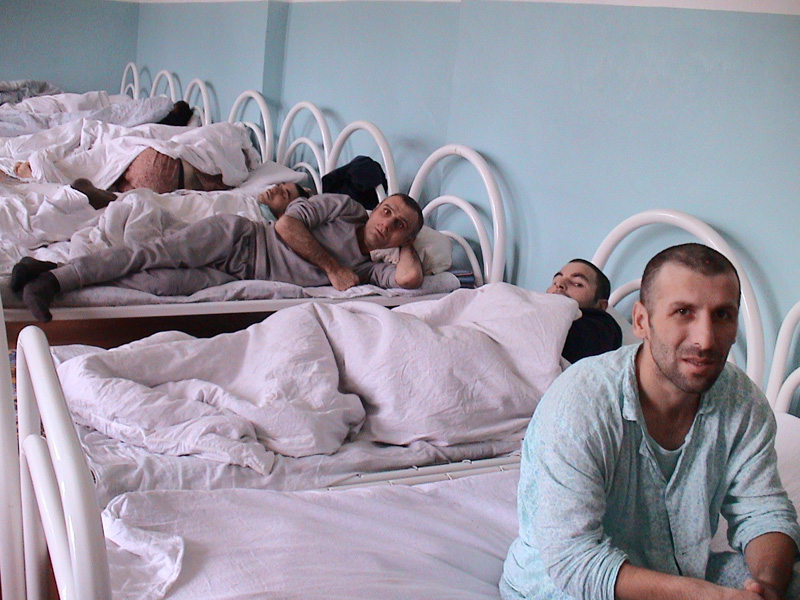
Russia Considering Restoring Soviet-Era Law on Psychiatry, Opening Door to Political Abuse
Publication: Eurasia Daily Monitor Volume: 9 Issue: 208
By:

Russian psychiatrists are pressing the Duma to return the Soviet-era law on psychiatric assistance that allowed doctors at Moscow’s Serbsky Institute and elsewhere to indefinitely detain and treat people whose only “symptoms” were opposition to Soviet leaders and their policies. For more than 40 years, the Communist Party used the provisions of this law against a wide range of dissidents. That tragic history sparked protests by psychiatrists, human rights activists and governments around the world and ultimately prompted Russian parliamentarians to replace that legislation with laws more in conformity with international practice.
On Monday (November 12), the Nakanune.ru news portal reported that “leading psychiatrists [of Russia] are seeking to return to operation the law on psychiatric assistance, which had been used in Soviet times,” a step that the news site suggested was “especially important after the recent mass shooting in Moscow” (www.nakanune.ru/news/2012/11/12/22291819/). On November 7, Dmitry Vinogradov posted a “malicious manifesto” on the Internet and then shot dead five of his colleagues and wounded two more at a pharmacy in Moscow where he worked (The Moscow News, November 7).
Mikhail Vinogradov (no relation), the head of the Center for Legal and Psychological Help in Extreme Situations, said at a press conference that there are occasions when “medicine must be a police function. We cannot allow the infected ill to freely walk around the land, and undoubtedly, we cannot allow that those seriously psychologically ill and socially dangerous can do the same, purchasing guns, ammunition and getting everything else.” That is why, he said, “a large group of St. Petersburg and Moscow psychiatrists” have appealed to the Duma to restore the Soviet-era law, something that he said would “allow for the treatment for the seriously ill and [give the authorities the power] to defend society from socially dangerous sick people.” The Duma is “discussing” this issue at present, Vinogradov concluded, “not as quickly as one would like, but all the same it is being discussed” (www.nakanune.ru/news/2012/11/12/22291819/).
Soviet abuse of this law, an abuse that Alexander Podrabinek called “a tool in the struggle against dissidents who cannot be punished by legal means” (Alexander Podrabinek, Punitive Medicine, Karoma Publishers, 1980), was one of the most odious forms of political repression in the Soviet Union. Hundreds if not thousands of opponents of the regime were diagnosed with such “illnesses” as “sluggish schizophrenia,” incarcerated in psychiatric hospitals known as “psikhushkas,” and forcibly medicated. This system was organized on the basis of the assumption of Soviet leaders that people living in a socialist society could not have an anti-socialist orientation and consequently that if they manifested such views, they were mentally ill.
While this form of psychiatric abuse began under Stalin, it was especially widespread from Khrushchev’s time onward. Among the most famous of the dissidents mistreated in this way were Vladimir Bukovsky, Pyotr Grigorenko, Joseph Brodsky, Valery Tarsis, Zhores Medvedev, Valeria Novodvorskaya, Natalya Gorbanevskaya, and members of the Association of Free Trade Unions.
So notorious were these cases that the international psychiatric community as well as Western scholars and governments organized a campaign against it. Psychiatric organizations in many countries as well as that profession’s international bodies documented and condemned what Moscow was doing. Scholars like Sidney Bloch, Peter Reddaway, Harvey Fireside, Robert van Voren, Theresa Smith and Thomas Oleszczuk prepared major and widely read studies. And the parliaments and governments in many countries held hearings, prepared reports, and demanded that the Soviet government end this most vicious form of human rights abuse.
Until the very end of the Soviet period, communist officials denied these reports, but in late 1991, the USSR Supreme Soviet began discussing overturning the law; however, the Soviet Union fell apart before it could act. Then in 1992, the Russian Federation passed a new law that most observers felt conformed to international standards and prevented abuse. To ensure that Russians knew their rights, the International Psychiatric Association printed 50,000 copies of the law and distributed them throughout Russia.
Unfortunately, that did not prove to be the end of this sordid story. Between 1998 and 2004, psychiatrists at the notorious Serbsky Institute—where many dissidents were confined, “diagnosed,” and “treated”—sought to have the Duma restore the Soviet-era law that gave them and the regime a free hand. Now, this same group of doctors, perhaps backed by officers of the Russian security services, is trying again. They may not succeed, but it is a mark of just how dangerous the situation has become that their actions have as yet attracted so little attention and that they think they have a chance this time around.
In his 1970 open letter to the public entitled, This Is How We Live, Aleksandr Solzhenitsyn wrote: “The incarceration of free thinking healthy people in madhouses is spiritual murder, it is a variation of the gas chamber, even more cruel; the torture of the people being killed is more malicious and more prolonged. Like the gas chambers, these crimes will never be forgotten and those involved in them will be condemned for all time during their life and after their death.” As this campaign goes forward, it is important for all concerned to remember these seminal words.




